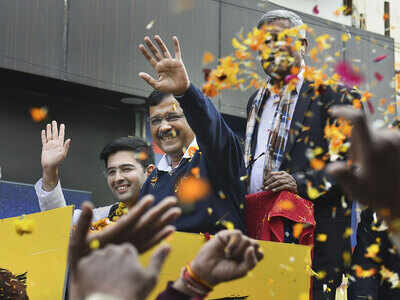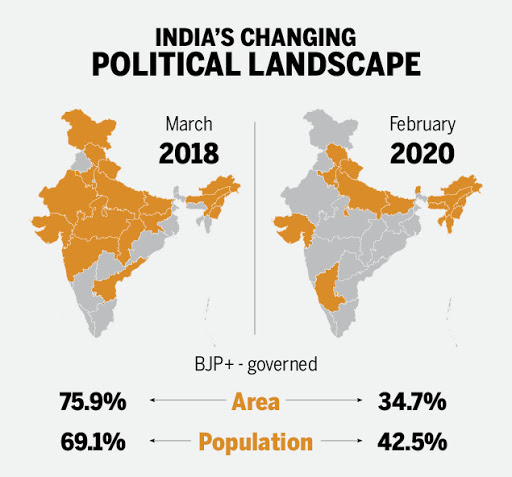
NEW DELHI: Arvind Kejriwal's Aam Aadmi Party is poised for a resounding victory in Delhi and is on the verge of retaining power for a third term. Meanwhile, the BJP will finish as a distant second and the Congress looks likely to draw a blank for the second time in a row.
Here are the key takeaways from today's results:
National vs state polls
The result of Delhi elections will prove again that the people of the country have made a clear distinction between national and state elections. In the 2019 general election, the BJP got 56.9 per cent of the votes and won all the 7 Lok Sabha seats in the national capital while AAP was a distant third with a vote share of 18.2 per cent. If the BJP vote share was translated into seats, the party would have got 65 seats while AAP only 5 seats. The Delhi election results show clear segregation of voting patterns and indicate that local issues reign supreme over the national political discourse.
Development model reaps dividends
Another term in Delhi will come as a shot in the arm for Kejriwal and signals that the people of Delhi have given a thumbs up to the work done by his party over the last five years. The AAP's campaign was focused on the report card of the Kejriwal government's work with education, health, electricity and water being the most highlighted parameters. AAP leaders, including Kejriwal, also maintained a safe distance from Shaheen Bagh and CAA protests despite BJP strongly raising these issues in the run-up to the assembly polls.
A faceless campaign that didn't pay off
Unlike 2015, BJP avoided naming a CM candidate in 2020 and banked mainly on Narendra Modi's popularity and core national issues. However, the results show that the gambit didn't pay off. Without a credible opponent, the Delhi elections were mainly a "Kejriwal vs rest" contest, much like the 2019 Lok Sabha template when Modi was dubbed as the sole factor by BJP. While "outsider" Manoj Tiwari spearheaded a spirited BJP campaign, the infighting within the state unit and lack of a strong local face helped AAP run a successful personality-oriented campaign centered around Kejriwal.
Congress a non-starter
The Congress will again settle for a consolation prize as it failed to win a single seat in the 70-member House for the second time in a row. Political observers had written off the party as a non-starter due to the erosion of its political credibility in Delhi and a lackluster campaign. A more assertive Congress would have added some punch to the "triangular" contest and could have led to a better division of anti-BJP and anti-AAP votes in Delhi. However, the results show that Delhi was always a direct contest between AAP and BJP.
The Shaheen Bagh factor
The results indicate that BJP's aggressive campaign rhetoric centered around the Shaheen Bagh protests failed to translate into significant electoral gains. In the days leading up to the Delhi polls, several BJP leaders, including Amit Shah, raised the pitch around CAA protests and Shaheen Bagh at every platform with a hope to consolidate votes. While the BJP managed to gain a vote share of roughly 6% compared to the 2015 assembly polls, the "Shaheen Bagh factor" was not potent enough to help the party take the fight to AAP.
A tough road to Bihar?
An election loss in Delhi, coming on the back of defeats in Maharashtra and Jharkhand, could weaken BJP's bargaining position vis-a-vis JD(U) and other allies in poll-bound Bihar. Amit Shah has said that the BJP-JD(U) will fight the elections in Bihar under the leadership of chief minister Nitish Kumar. With BJP struggling to either win or retain power in key states like Maharashtra, Jharkhand and now Delhi, the JD(U) chief would be in a better position to drive a hard bargain during seat-sharing talks later this year.

The changing political landscape
The political landscape of the country has changed drastically in just two years with the BJP-led NDA losing power in as many as six states. There are now non-BJP governments in 12 states while the NDA is in power in 16. While the BJP did manage to improve its Lok Sabha performance, the diminishing saffron footprint would certainly worry the top brass ahead of key state elections this year. The loss in Delhi would also be a setback for new BJP chief J P Nadda as he seeks to fill the void left behind by Amit Shah - the architect of several BJP victories.
Here are the key takeaways from today's results:
National vs state polls
The result of Delhi elections will prove again that the people of the country have made a clear distinction between national and state elections. In the 2019 general election, the BJP got 56.9 per cent of the votes and won all the 7 Lok Sabha seats in the national capital while AAP was a distant third with a vote share of 18.2 per cent. If the BJP vote share was translated into seats, the party would have got 65 seats while AAP only 5 seats. The Delhi election results show clear segregation of voting patterns and indicate that local issues reign supreme over the national political discourse.
Development model reaps dividends
Another term in Delhi will come as a shot in the arm for Kejriwal and signals that the people of Delhi have given a thumbs up to the work done by his party over the last five years. The AAP's campaign was focused on the report card of the Kejriwal government's work with education, health, electricity and water being the most highlighted parameters. AAP leaders, including Kejriwal, also maintained a safe distance from Shaheen Bagh and CAA protests despite BJP strongly raising these issues in the run-up to the assembly polls.
A faceless campaign that didn't pay off
Unlike 2015, BJP avoided naming a CM candidate in 2020 and banked mainly on Narendra Modi's popularity and core national issues. However, the results show that the gambit didn't pay off. Without a credible opponent, the Delhi elections were mainly a "Kejriwal vs rest" contest, much like the 2019 Lok Sabha template when Modi was dubbed as the sole factor by BJP. While "outsider" Manoj Tiwari spearheaded a spirited BJP campaign, the infighting within the state unit and lack of a strong local face helped AAP run a successful personality-oriented campaign centered around Kejriwal.
Congress a non-starter
The Congress will again settle for a consolation prize as it failed to win a single seat in the 70-member House for the second time in a row. Political observers had written off the party as a non-starter due to the erosion of its political credibility in Delhi and a lackluster campaign. A more assertive Congress would have added some punch to the "triangular" contest and could have led to a better division of anti-BJP and anti-AAP votes in Delhi. However, the results show that Delhi was always a direct contest between AAP and BJP.
The Shaheen Bagh factor
The results indicate that BJP's aggressive campaign rhetoric centered around the Shaheen Bagh protests failed to translate into significant electoral gains. In the days leading up to the Delhi polls, several BJP leaders, including Amit Shah, raised the pitch around CAA protests and Shaheen Bagh at every platform with a hope to consolidate votes. While the BJP managed to gain a vote share of roughly 6% compared to the 2015 assembly polls, the "Shaheen Bagh factor" was not potent enough to help the party take the fight to AAP.
A tough road to Bihar?
An election loss in Delhi, coming on the back of defeats in Maharashtra and Jharkhand, could weaken BJP's bargaining position vis-a-vis JD(U) and other allies in poll-bound Bihar. Amit Shah has said that the BJP-JD(U) will fight the elections in Bihar under the leadership of chief minister Nitish Kumar. With BJP struggling to either win or retain power in key states like Maharashtra, Jharkhand and now Delhi, the JD(U) chief would be in a better position to drive a hard bargain during seat-sharing talks later this year.

The changing political landscape
The political landscape of the country has changed drastically in just two years with the BJP-led NDA losing power in as many as six states. There are now non-BJP governments in 12 states while the NDA is in power in 16. While the BJP did manage to improve its Lok Sabha performance, the diminishing saffron footprint would certainly worry the top brass ahead of key state elections this year. The loss in Delhi would also be a setback for new BJP chief J P Nadda as he seeks to fill the void left behind by Amit Shah - the architect of several BJP victories.
Download The Times of India News App for Latest Elections News.
more from times of india news
Get the app









